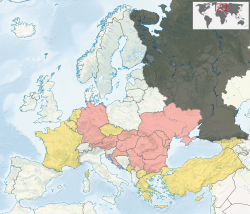Danube Commission | |
|---|---|
 Members Observers Ex-members | |
| Administrative center | Budapest, Hungary |
| Official languages | |
| Membership | |
| Establishment | 11 May 1949 |
Website www | |
The Danube Commission (French: Commission du Danube; German: Donaukommission; Russian: Дунайская комиссия, romanized: Dunayskaya komissiya; Ukrainian: Дунайська комісія, romanized: Dunayska komisiya) is concerned with the maintenance and improvement of navigation conditions of the Danube River, from its source in Germany to its outlets in Romania and Ukraine, leading to the Black Sea. It was established in 1948 by seven countries bordering the river, replacing previous commissions that had also included representatives of non-riparian powers. Its predecessor commissions were among the first attempts at internationalizing the police powers of sovereign states for a common cause.
Members include representatives from Austria, Bulgaria, Croatia, Germany, Hungary, Moldova, Romania, Serbia, Slovakia, and Ukraine.
The commission dates to the Paris Conferences of 1856, which established for the first time an international regime to safeguard free navigation on the Danube, and of 1921, which resurrected the international regime after the First World War.[1]